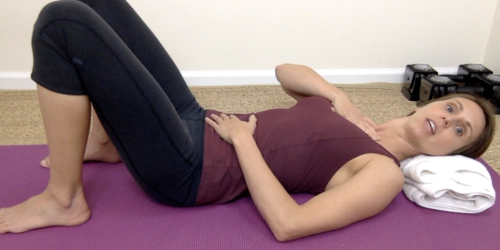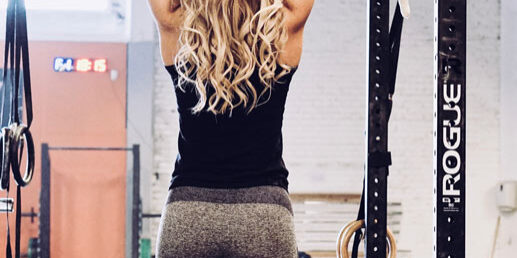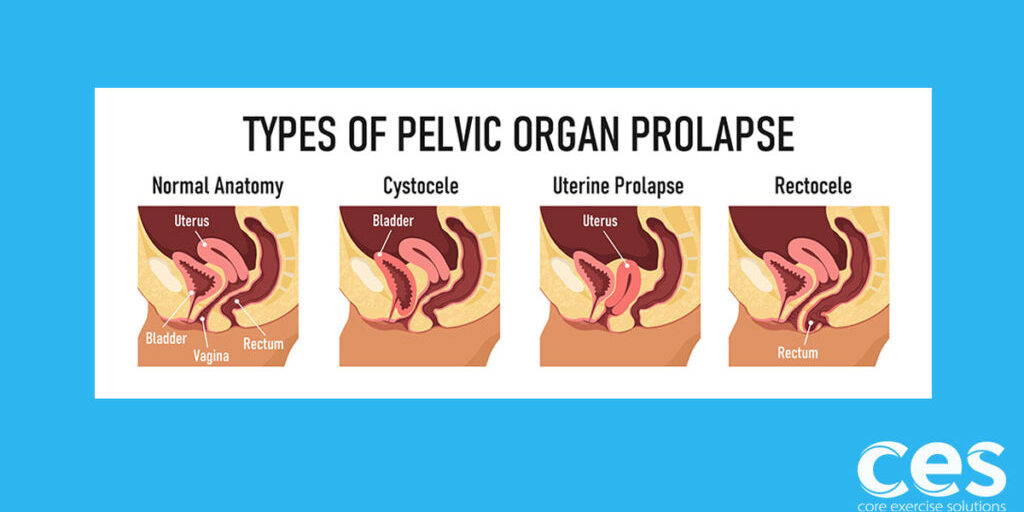Do you leak or have clients who leak? It can be a complex topic and there are actually times when leaking could be a good sign. Let’s dive into the details and see what interesting takeaways we can pull out.
So, there are two ends of the spectrum right now when it comes to leaking. On one hand you have the box gym camp, familiarizing people with bladder leaking during exercise and making women feel more comfortable about it happening. This can be good to bring awareness to it, but it can also be bad when no one is talking about seeking help. On the other hand, there is the women’s health camp that says stress incontinence is never ok. Which (generalizing of course) camp is right?
Reasons for leaking #1.
Strength gets out of balance for pressure regulation or impact demand. When you cough, sneeze or lift heavy weights, you increase pressure in your core and down on your pelvic floor. Think about pressure as bracing or keeping your spine still. For a cough or sneeze, you’re using that pressure to push particles out of your body. The more pressure relative to your strength, the more demand on your pelvic floor and chance of leaking. The same thing can happen with jumping. That’s impact pressure. If the pressure you generate is greater than the strength of your pelvic floor, then you can experience even small amounts of bladder leaking.
Sometimes there’s an easy fix, and sometimes it’s a bit complicated and takes peeling back quite a few layers. This is where seeing a women’s health professional and learning more about how the pelvic floor works can come in handy. It could be strength, but timing can also be a factor. The pelvic floor has both fast twitch and slow twitch muscle fibers, so your fast twitch fibers might just need a little training. You might also need to learn how to decrease pressure.
Reasons for leaking #2.
Your cystocele or urethrocele is actually improving. This is when bladder leaking can be a great sign!!! I’ve had clients with a grade 2 front prolapse who could exercise without leaks. (Think about prolapse as things hanging down.) As we improved their prolapse they have started leaking, but their prolapse is improving— so what gives?! This is where the layers of healing come in. Think about it as a kink in a pipe. When a pipe is straight, it’s much easier for fluid to come out. When a pipe has a kink, it’s harder. So, it makes sense that in the process of improving prolapse you might leak, whereas before you didn’t.
You may also need to look into using a pessary for prolapse support when engaging in high-pressure activities once strategies have been analyzed. (This is especially true if you're early postpartum.)
It’s important to think about this as a part of the process and keep moving forward. Keep going, learning and improving, and things can continue to get better (including the leaking!)
Reasons for leaking #3.
Do you need to overload? Is your pelvic floor simply not getting enough overload training to handle what you’re throwing at it? Overloading a muscle helps it get stronger. It might be that you’re making everything else stronger but not your pelvic floor. This might be a case where vaginal weights can be helpful. You might need a little more umph than just doing basic contractions. This is also why I like balloons. They help to increase abdominal pressure in a controlled environment where you can think about your pelvic floor and your abs.
So, is leaking because of this reason necessarily the end of the world? Maybe not, but that doesn’t mean with a little extra effort it can’t be resolved. Worth it!
Reasons for leaking #4.
Your pelvic floor is a little tight. It’s really hard to get a great contraction of a tight muscle. I’ve seen some people who are over-recruiting or over-contracting their pelvic floor and that’s actually what’s causing them to leak. When we work on relaxing, decreasing pressure and correct breathing, the issue goes away. Was leaking due to tightness causing horrible long-term damage? Probably not, but when something can be helped, why deal with it?
Tightness or over-contracting in the front of the pelvic floor can also cause irritation, leading to a feeling of needing to frequently urinate. This is when you go to your doc thinking you must have a UTI and the culture comes back negative.
Reasons for leaking #5.
You have a hip injury. Oh, the kinetic chain. It’s such a beautifully frustrating thing. I’ve had some clients stop leaking when we fix their hip and decrease the impingement, piriformis pain, TFL tightness, etc. without ever addressing the pelvic floor.
I like to think about it as two sides lining up. When you move the femur due to hip tightness/dysfunction/pain, it changes the orientation of the secondary pelvic floor muscles, like the piriformis, obturator internus and externus, which can increase tightness or overactivity. The pelvic floor works together for strength and pressure management so when you have a hip issue throwing things off, you can get leaking, pain or tightness of the pelvic floor as a result. It will have nothing to do with the pelvic floor and doing more kegels won’t do squat for resolving the leaking. Unless you address the cause of the hip issue, the leaking will continue or keep coming back after release work. (I also see this frequently with prolapse that won’t improve. It’s not always all about kegels.)
Reasons for leaking #6.
Are you worried about leaking or is life really stressful right now? Holding tension in the pelvic floor can cause bladder leaking. Anxiety is an interesting thing… I’ve had clients only leak when they are in a room full of people trying to talk. Or as soon as they walk into the gym on the day they know they are going to max out. Nerves are high. Tension is there creating a functional tightness scenario. (It often happens from holding the abs too tightly and slipping into a shallow breathing pattern.) Meditation and body awareness are really helpful for this.
Reasons for leaking #7.
Bladder irritants. Some women experience leaking when their bladder is irritated. Common irritants are coffee, wine, chocolate, etc. You know, everything good in life! Cutting out coffee before exercise might stop the leaking without doing anything else. This means there could still be an underlying issue though, when a system is that sensitive to something it makes me wonder why.
Reasons for leaking #8.
Hormones. Are you postpartum? Are you starting into menopause and maybe it’s catching you by surprise? Loss of hormones can be a dramatic change for the pelvic floor muscles. Hormones help us build muscle but they don’t control everything. It might be you’ll need a bit of extra strengthening and/or some vaginal estrogen. If you think hormones could be the reason, it’s a good thing to bring up to your doctor and get tested.
Reasons for leaking #9.
Maxing out? This is another one where if you leak a tiny bit when you max out the weight you lift in the gym, is there really a huge problem? Well, probably not. Is it a sign that you increased intra-abdominal pressure higher than what your pelvic floor can handle? Yep. Do you have any bulging or signs of prolapse after? If no, then it’s probably not the end of the world, but I would keep that in mind. It might just be you need a pinch of awareness to contract the front of your pelvic floor during lifts to get the pattern in place for when you max out. Sometimes it IS all about kegels and being able to do them correctly! Or maybe you change your breathing pattern when you max out and that’s creating the issue.
Should you push to that place? Maybe. Could there be a better strategy for you to utilize? Maybe. That’s going to be a case by case basis where you analyze strategies and long-term goals for your body. I’m not here to judge. I’m just here to help! I get the need to push.
(I have a few more reasons that get a bit technical, like maintenance of the diaphragm dome shape for an optimal pelvic floor response, but this was a great starting point for a 3-page blog that hopefully got you thinking! ?)
So, bottom line?
Leaking can come from many, many, many different issues. Some are really easy to fix, and some are not. Some leaking can mean you’re improving, but some can mean you need improvement.
The biggest encouragement I can give you is to keep learning! Learn all you can about your body and what makes it feel good and perform well. Seek help! Once that knowledge is gained, no one can ever take that away from you and you will always be your own best advocate. The human body is an incredible thing and since it’s the only one we have, it’s worth the effort.
Free Pelvic Floor Educational Series
Dr. Sarah Duvall, PT, DPT, CPT and the CES Team have helped thousands of women create the strength and stability needed to overcome common and not-so-common pelvic floor issues.
Join us today for this 4-part Pelvic Floor Video Series, absolutely free.
We don't spam or give your information to any third parties. View our Terms of Use and Privacy Policy.
Having trouble signing up? Click here











